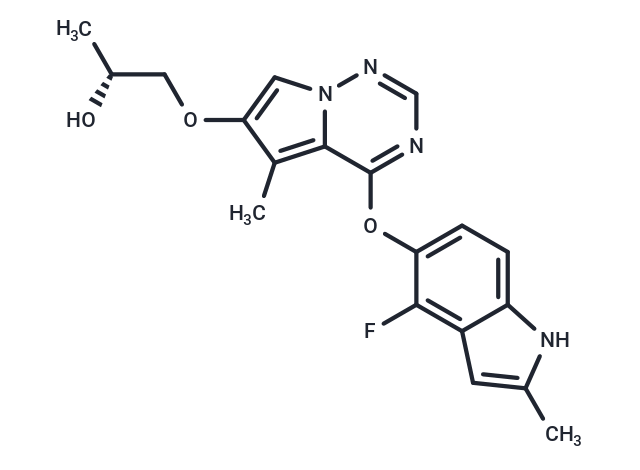Shopping Cart
Remove All Your shopping cart is currently empty
Your shopping cart is currently empty
Brivanib (BMS-540215) is an ATP-competitive inhibitor targeting VEGFR2 with an IC50 of 25 nM, exhibiting moderate potency against VEGFR-1 and FGFR-1, and over 240-fold selectivity against PDGFR-β. Phase 3.

| Pack Size | Price | USA Warehouse | Global Warehouse | Quantity |
|---|---|---|---|---|
| 1 mg | $39 | In Stock | In Stock | |
| 5 mg | $90 | In Stock | In Stock | |
| 10 mg | $147 | In Stock | In Stock | |
| 25 mg | $273 | In Stock | In Stock | |
| 50 mg | $395 | In Stock | In Stock | |
| 100 mg | $589 | - | In Stock | |
| 200 mg | $857 | - | In Stock | |
| 1 mL x 10 mM (in DMSO) | $98 | In Stock | In Stock |
| Description | Brivanib (BMS-540215) is an ATP-competitive inhibitor targeting VEGFR2 with an IC50 of 25 nM, exhibiting moderate potency against VEGFR-1 and FGFR-1, and over 240-fold selectivity against PDGFR-β. Phase 3. |
| Targets&IC50 | VEGFR2:25 nM |
| In vitro | Brivanib also inhibits VEGFR1 and FGFR-1 with IC50 of 0.38 μM and 0.148 μM. Brivanib is not sensitive to PDGFRβ, EGFR, LCK, PKCα or JAK-3 with IC50 all above 1900 nM. Brivanib could inhibit the proliferation of VEGF-stimulated HUVECs with IC50 of 40 nM, compared to 276 nM in FGF-stimulated HUVECs. On the other hand, Brivanib exhibits low activity to tumor cell lines. [1] |
| In vivo | Brivanib exhibits antitumor activity in H3396 xenografts in athymic mice, completely inhibiting tumor growth at 60 and 90 mg/kg (p.o.) with TGIs of 85% and 97%, respectively [1]. It also significantly suppresses tumor growth in Hepatocellular carcinoma (HCC) xenografts by decreasing VEGFR2 phosphorylation, resulting in tumor weights of 55% and 13% compared to controls at doses of 50 mg/kg and 100 mg/kg. Brivanib shows potential for efficient treatment of HCC [2]. |
| Kinase Assay | In Vitro Kinase Assays: Recombinant proteins containing tyrosine kinases are expressed as GST fusion proteins using baculovirus expression vector system in Sf9 cells. All enzymes are stored at -80 °C. Brivanib is dissolved in DMSO and diluted by water/10% DMSO. The VEGFR2 kinase solution is composed by 8 ng GST-VEGFR2 enzyme, 75 μg/mL substrate, 1 μM ATP, and 0.04 μCi [γ-33P]-ATP in 50 μL buffer: 20 mM Tris (pH 7.0), 25 μg/mL BSA, 1.5 mM MnCl2, 0.5 mM dithiothreitol). Flk-1 kinase solution is composed by 10 ng GST-Flk-1 enzyme, 75 μg/mL substrate, 1 μM ATP, and 0.04 μCi [γ-33P]-ATP in 50 μL buffer: 20 mM Tris, pH 7.0, 25 μg/mL BSA, 4 mM MnCl2, 0.5 mM dithiothreitol). The reactions are incubated for 1 hour at 27 °C and terminated with cold trichloroacetic acid (TCA) to a final concentration of 15%. These TCA precipitates are collected onto unifilter plates and quantitated by liquid scintillation counter. |
| Cell Research | The cells are stimulated by VEGF or FGF at a concentration of 8 or 80 ng/mL. These cells are seeded in 96 well plates at a density of 2 × 103 and incubated for 24 hours. Brivanib at various dilutions are added to the cells for another 48 hours. Then 0.5 μCi of [3H] thymidine is added for 24 hours. After that the incorporated tritium is quantified using a β-counter. (Only for Reference) |
| Synonyms | BMS-540215 |
| Molecular Weight | 370.38 |
| Formula | C19H19FN4O3 |
| Cas No. | 649735-46-6 |
| Smiles | C[C@@H](O)COc1cn2ncnc(Oc3ccc4[nH]c(C)cc4c3F)c2c1C |
| Relative Density. | 1.42 g/cm3 |
| Color | Yellow |
| Appearance | Solid |
| Storage | Powder: -20°C for 3 years | In solvent: -80°C for 1 year | Shipping with blue ice/Shipping at ambient temperature. | ||||||||||||||||||||||||||||||||||||||||
| Solubility Information | Ethanol: 3 mg/mL (8.1 mM), Sonication is recommended. DMSO: 69 mg/mL (186.3 mM), Sonication is recommended. H2O: <1 mg/mL | ||||||||||||||||||||||||||||||||||||||||
| In Vivo Formulation | 10% DMSO+40% PEG300+5% Tween 80+45% Saline: 2 mg/mL (5.4 mM), Sonication is recommended. Please add the solvents sequentially, clarifying the solution as much as possible before adding the next one. Dissolve by heating and/or sonication if necessary. Working solution is recommended to be prepared and used immediately. The formulation provided above is for reference purposes only. In vivo formulations may vary and should be modified based on specific experimental conditions. | ||||||||||||||||||||||||||||||||||||||||
Solution Preparation Table | |||||||||||||||||||||||||||||||||||||||||
Ethanol/DMSO
DMSO
| |||||||||||||||||||||||||||||||||||||||||
| Size | Quantity | Unit Price | Amount | Operation |
|---|

Copyright © 2015-2025 TargetMol Chemicals Inc. All Rights Reserved.